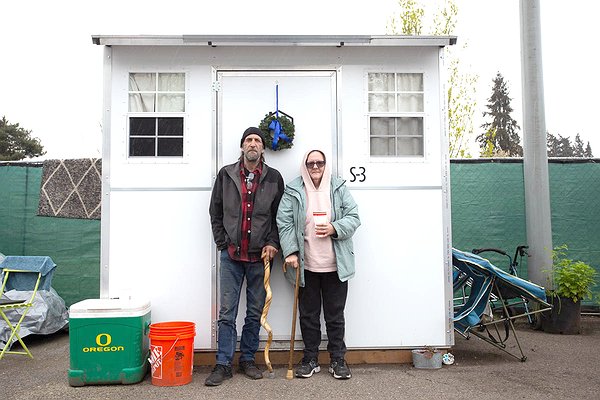Sleep Center sheds to be replaced with Pallet shelters
MOSES LAKE — The Open Doors Sleep Center will get an upgrade soon.
The Moses Lake City Council gave final approval March 26 for the purchase of 40 Pallet Shelter structures to replace the sheds currently in use. The move has been in the works for some time, City Manager Kevin Fuhr said, but the city wanted to move quickly to get a good deal on the shelters.
“The Pallet shelters that we're purchasing, they don't make anymore,” Fuhr said. “They've got 100 available to purchase, and we're trying to secure 40 of them. That's why we wanted to get this done ASAP ... because the new Pallet shelters that they're building are costing more money and we didn't want to pay more if we didn't have to.”
The purchase from Pallet Shelter includes 37 64-square-foot shelters and three 100-square-foot with locking doors, folding bunk beds, heaters and air conditioners, according to the contract, as well as two two-stall bathrooms with toilet, shower and sink, one of them ADA-compliant with a full bathtub. The shelters are due to be delivered by mid-June and will be assembled on-site by the company.
The shelters come in kits that take less than an hour each to assemble, according to information from the company. They are built to last at least 10 years and are made from materials that are easy to sanitize and resistant to bugs and mildew. They’re also easily portable, in the event the city decides to move the center from its current location at East Broadway Avenue and State Route 17.
The 64-square-foot shelters are priced at slightly under $8,000 apiece, and the 100-foot units at just under $12,000, according to the contract. The total price works out to slightly over $524,000, which will be paid for by an ARPA grant from Grant County.
“Right now we've got 37 sheds that are just Ziggy’s (Home Improvement) sheds that were modified,” Fuhr said at the March 26 meeting. “And they're not really holding up to human habitation. These Pallet shelters were designed specifically for the homeless community.”
Pallet Shelter, based in Everett, is a public benefit corporation, a hybrid of private and nonprofit business that operates for the public good while still generating revenue for its shareholders, according to its website. It was started in 2016 by Amy and Brady King, owners of a construction company, who had a large number of employees who were struggling because of a history of incarceration or homelessness, then-Director of Marketing and Communications Katya Hill told the Columbia Basin Herald in a previous interview. Pallet has since partnered with both cities and charities to create villages of temporary housing all over the country. The majority of Pallet’s employees have experienced homelessness, addiction or other trauma, Hill said.
Written into Pallet’s contract with the city are the company’s dignity standards, which obligate the city to provide not just maintenance but access for residents to transportation and a “safe, affirming and dignified atmosphere.”
“Our contracts are very clear,” Hill said. “This is not a permanent housing solution. You need to have a plan to transition your people into the site but also out of the site. And that transition plan has to have caseworkers, it has to have mental health support, it needs to have access to treatment if they need treatment. You need to be placing them near a transport hub so that they can travel to and from employment or education or to hospitals and other health care facilities … So we have kind of an umbrella of dignity standards that we work with the service provider to provide in that village environment.”
Joel Martin may be reached via email at jmartin@columbiabasinherald.com.





